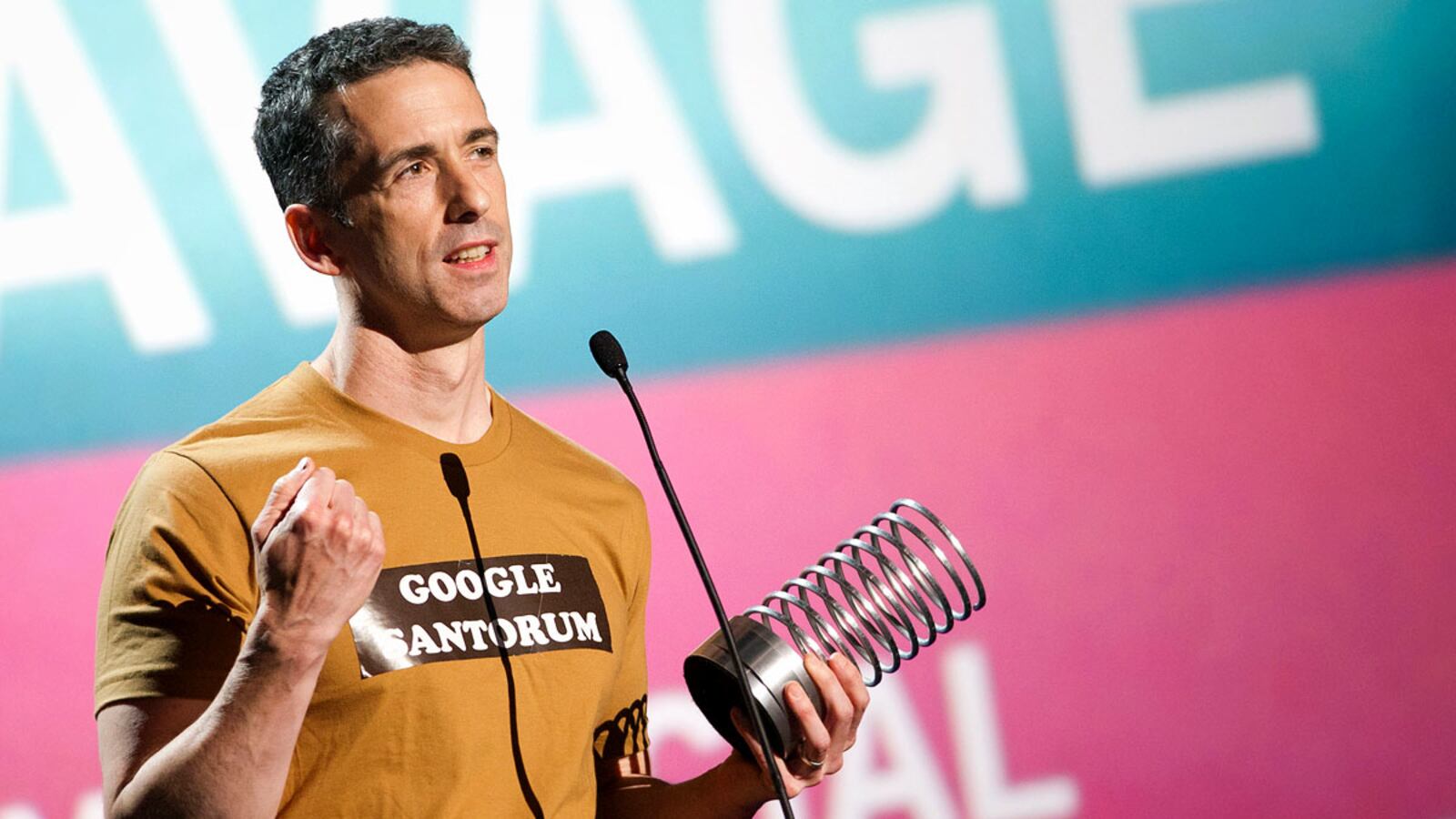Last week Dan Savage, the celebrated gay sex columnist and writer, was set to give a speech at Vancouver’s Vogue Theatre when a group of activists approached him and threw glitter in his face—an activity known as “glitterbombing.” They were part of a transgender-activist group calling themselves the Homomilitia, and they were there to protest what they perceived as Savage’s transphobia. Of his many perceived offenses: in 2003 he used the word “tranny” in one of his columns, and he used the word “shemale” to describe a male-to-female trans woman in another column—among other things like being a “cisgendered, gay white male, as if those are self-evidently awful things,” said Savage in an interview Friday.
This is the second time the transgender ally has been glitterbombed. But Savage is not alone. He joins an impressive array of high-profile celebrities who are gay or trans-friendly who have been called to the carpet by trans activists. Neil Patrick Harris, Lance Bass, and Kelly Osbourne have all found themselves in hot water with the trans community. With the new civil-rights frontier cresting for trans people, “tranny” is no longer considered OK.
Harris, an out gay man, offended the transgender community in December by using the word “tranny” on live TV when he was guest-hosting Live! With Kelly. After he inhaled sulfur hexafluoride, a compound that acts like helium, his voice got very deep. He mimicked The Silence of the Lambs’ Buffalo Bill, joking, “Put the lotion in the basket.” After his voice returned to normal, he laughed and said, “I’ve never sounded more like a tranny in my life!”
But once off the air, he apologized on Twitter: “Truly sorry for saying the word ‘tranny’ on Live this week. Twice! Should have been more thoughtful. Didn’t at all mean to offend.”
Meanwhile, in November, Kelly Osbourne gave an interview to the U.K.'s Glamour magazine and talked about her breakup with her former fiancé, Luke, who had cheated on her with a preoperative male-to-female transsexual.

“Everyone kept telling me that Luke was cheating on me, but I never believed them,” she said. “It’s hard enough to get your head around someone cheating on you, but when that someone is a chick with a dick. Up until then, I’d always thought that the worst way to get cheated on would be with an ugly girl. Don’t you think?”
Like Harris, Osbourne took to Twitter. First to defend herself against a blogger who accused her of bigotry—and later wrote about it on the Huffington Post—and then to apologize for using a word that many Americans still aren’t aware is upsetting.
In response to Harris’s apology, GLAAD released a statement commending him. It read in part: “Many people do not realize that the word ‘tr*nny’ is one of the most hurtful and dehumanizing slurs that transgender people hear. Most transgender people associate that word with personal experiences of violence, hatred and derision.”
And in December, Lance Bass also apologized for using “tranny” on Access Hollywood Live, and wrote an apology on the Huffington Post that explained why he didn’t know it was offensive: “When I use the word ‘tranny,’ I am picturing Tim Curry’s Frank-N-Furter character in The Rocky Horror Picture Show, or the wildly hilarious Eddie Izzard. I certainly don’t think of Chaz Bono or someone questioning the body they were born into.”
Bass’s confusion is shared by many—including Savage, who has since been schooled.
“The whole idea is that the word ‘tranny’ is on par with the ‘N’ word; it’s the ‘T’ word, and ‘faggot’ is the F word—that’s a new development,” Savage said. “The word ‘tranny’ wasn’t discussed as this hate term until very recently, when the top-secret memo went out, but it didn’t go out to everyone all at once. There’s this learning curve that everyone’s on. I’ve stopped using the word except when I’m constantly forced to talk about the fact that I don’t use the word, which forces me to use the word, and, literally, that has been held as evidence of my transphobia.”
Savage says he’s not transphobic and, like many Americans, is still learning about the intricacies of trans issues. “I’ve been writing my column for 21 years, we know more now about these issues than we did 21 years ago, we’ve all been on a journey around trans issues.”
But not everyone agrees that "tranny" is always a hateful term. RuPaul, the most famous drag queen in the world, told Michelangelo Signorile he didn’t think Bass should have apologized at all for using the word. “I love the word ‘tranny’!" RuPaul told Signorile. “In fact, you have to go to the intent of the person saying it. Of course Lance Bass, his intent would never be to be derogatory. Never. So, you know, that’s really ridiculous. And I hate the fact that he’s apologized. I wish he would have said, 'F-you, you tranny jerk!'”
In December, Time magazine declared transgender people’s struggle as the next civil-rights frontier. But like gays and lesbians before them, the trans community has to reeducate a mostly ignorant public over commonly used phrases that have permeated the American slang lexicon—words that are often used by gays and lesbians themselves. And it’s going to be a long, hard slog.
Even more confusing than removing words like “tranny” from hurtful use is the shifting and rapidly evolving use of pronouns. Simply put, “he” and “she” don’t cut it for some transgender people.
Discussions about pronoun usage and binary gender (simply: defining all gender as male or female) that used to take place only within the trans community are being launched into the mainstream. The terms “cisgendered” and “bio”—used to describe people who are biologically male or female and whose gender matches their biological sex organs—and the pronouns ze, zir, hir, used in place of "he" and "she" to address trans people who reject binary gender definitions, have been increasingly more present in mainstream debates.
Last year, when New York magazine profiled Justin Vivian Bond, who had just come out as a trans person, the magazine outraged Bond because it didn’t use Bond’s preferred pronoun, “v,” and referred to Bond repeatedly as “he.”
Bond—who gained fame as a formerly male-identified performer in the Broadway show Kiki and Herb—wrote at length in a blog post, excoriating the writer, who is gay, and the magazine, saying: “What I was offended by was the tone and what I consider to be extremely aggressive gender policing throughout the story. Within the first three sentences I was referred to as ‘he’ seven times.”
But as Susan Stryker, a transgender historian and director of the Institute for LGBT Studies at the University of Arizona, explains, while it’s easier to change and introduce new words to the English language, “it’s really hard to introduce a new pronoun. You can invent a new word, and it’s a new noun, and people will start using it.”
“I think what’s happening is that movement is moving very quick,” says Buck Angel, a female-to-male transgender porn star, of the trans activists who are pushing for new pronouns perhaps faster than the American public is ready. “And they’re very political, OK? Here’s the problem when you do that, you alienate, right? And when you alienate you’re not getting your message out there.”
“It’s like you have to speak in baby talk, OK?” says Angel. “So when you start saying ‘cisgender,’ I don’t use the word ‘cisgender,’ I don’t even know what that fucking means. And by making all this new vocabulary, bottom line is they’re alienating the rest of the people in the world who want to understand and then get sort of irritated—they just don’t understand. Isn’t the point of us to educate the world to understand us that we’re just normal?”
“I think the pronoun-change thing strikes much deeper than just introducing a new gender concept,” says Stryker. “And that it’s going to be much more difficult to change—you know that you can’t just make it change just because you say so.”
She pauses. “And yet, you know, we have poetry, right? And what’s poetry but pushing language to its limits?”
Even within the greater trans community, there is some infighting. Both Bond and the transgender son of Warren Beatty and Annette Bening, Stephen Ira, have taken Chaz Bono to task for his more traditional definition of transgender identity—to them, he has a limited, binary worldview. Glass wrote in a post on his blog titled “Why Chaz Bono Is a Misogynist Who Does Not Represent Us” that he thought Bono was sexist. He clarified in a second post, “I just don’t want anyone thinking that he’s qualified to offer Trans 101, you know?”
Bond took aim and fired, too. “Chaz Bono is the new male terrorist fighting progressive gender roles and re-affirming the binary with every step of his transition. No wonder Cher is confused.”
But, says Savage, Chaz and Stephen and Justin can be good spokespeople for the new trans movement: “There are different ways of being trans and not just one way, and there are also different ways of being gay,” he says. “Chaz understands his journey around gender and his transition differently than Warren Beatty’s son. Do we really have to pick which one we are going to crucify? To determine who is deemed absolutely right and who is absolutely true? It’s doctrinaire psychosis. It’s Stalinism and Trotskyite horseshit.”
Savage thinks those who are infighting within the LGBT world are missing the point; and, he says, the trans activists glitterbombing him should see him as an ally who can spread the word about their cause.
“As I’ve said to people, if I’m the enemy, you lost the war, it’s over,” he says.
“If I am the enemy, what are the people on the right who are attacking trans children or you know, Keith Ablow, that writer for Fox News who went after Chaz Bono with hammer and tongs and said that parents shouldn’t allow their children to watch Chaz Bono on Dancing With the Stars because their sons would want to get their ‘penises amputated’?” says Savage. “If I’m transphobic, what word do you reserve for him?”
Editor's Note: An earlier version of this story misidentified Stephen Ira as Stephen Ira Glass.






